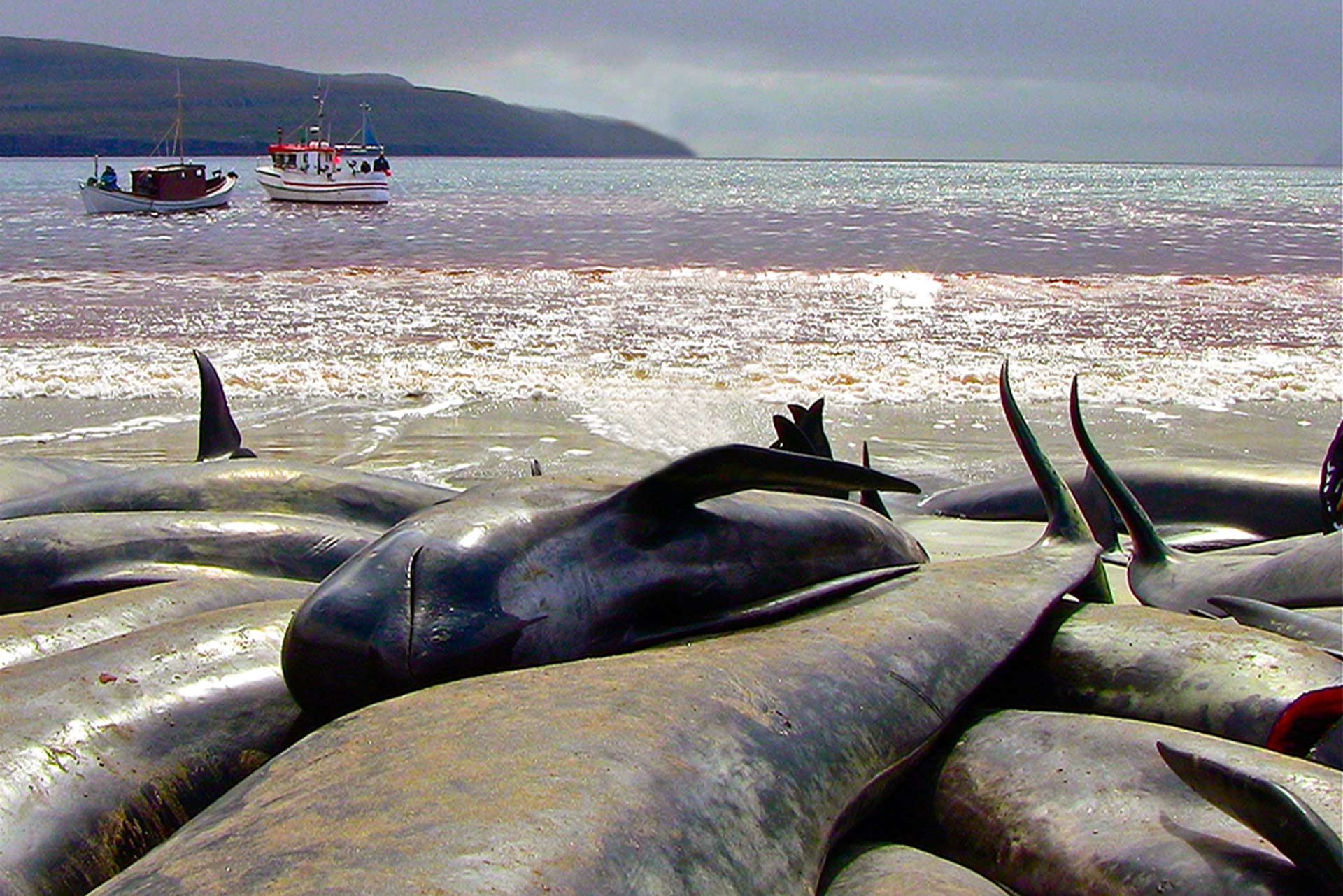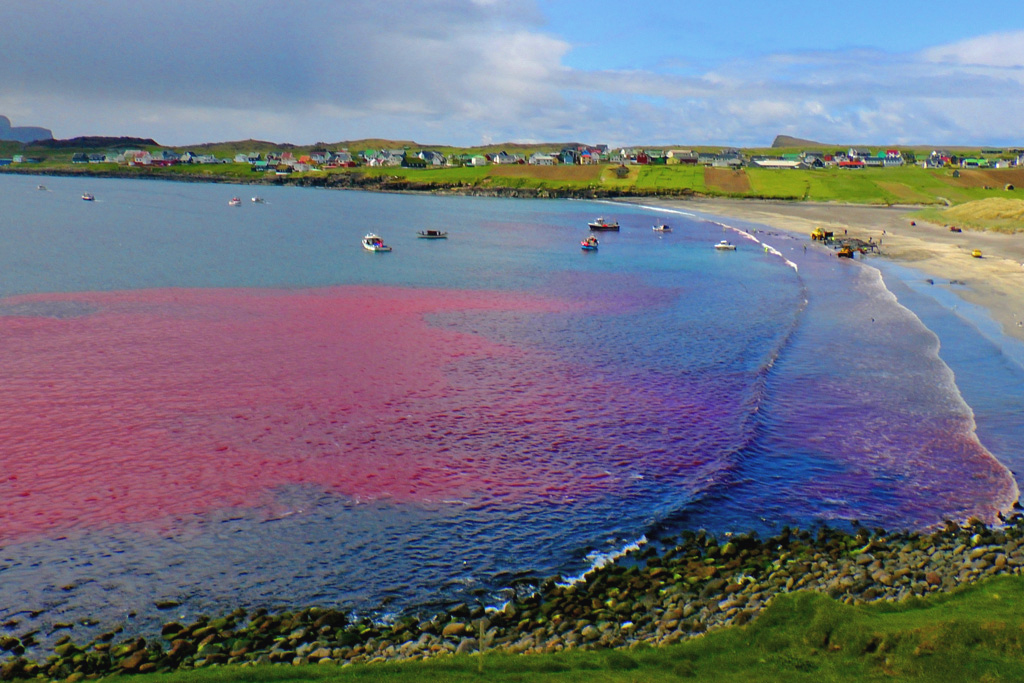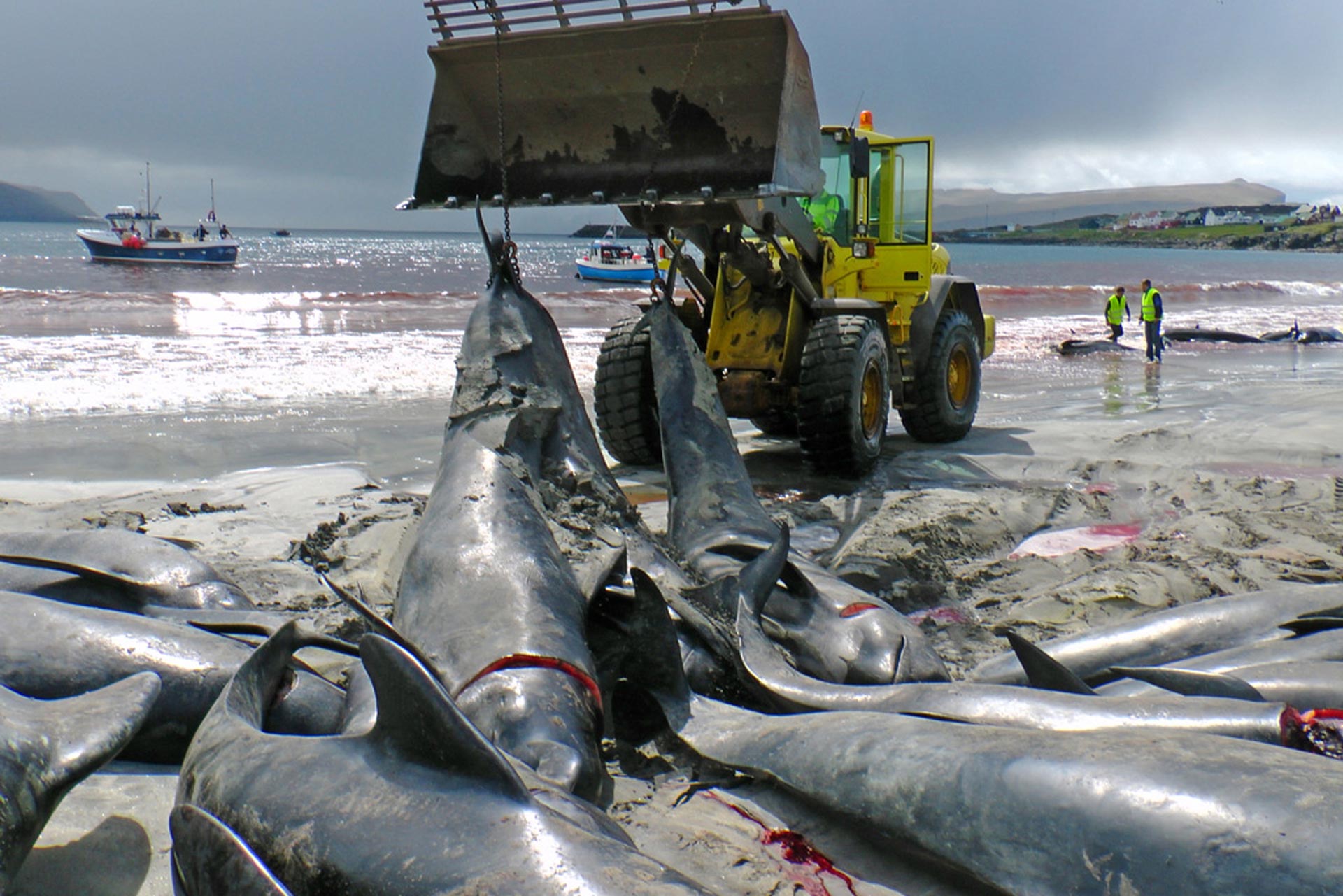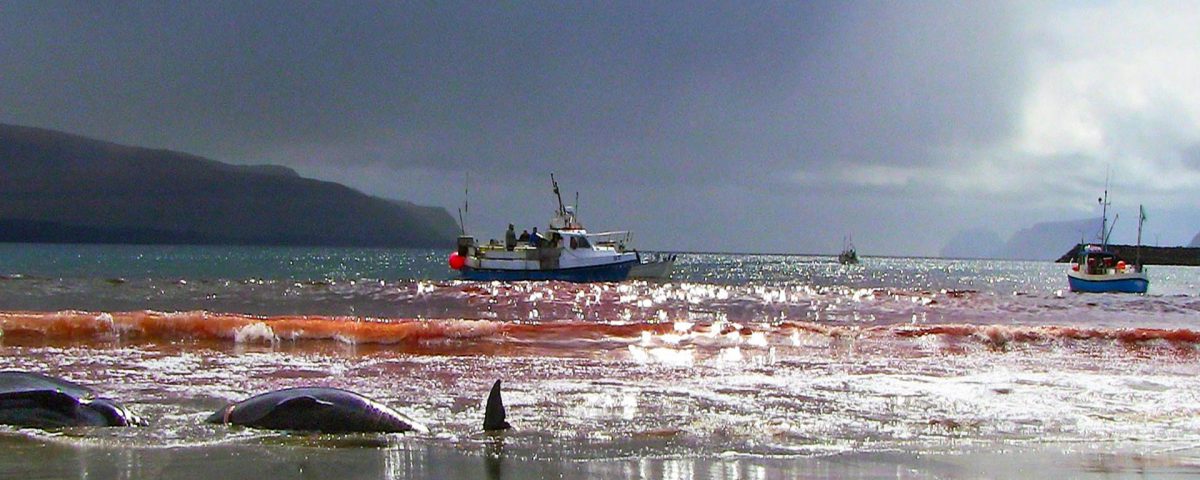
Hunted pilot whales. Photo was taken on June 5, 2012 in the Bay of Sandur. Photo: Leah Lemieux
Another summer is here and in the Nordic archipelago of the Faroe Islands, the fjords again run red with the blood of many pilot whales.
These infamous Faroese drive hunts, or grindadráp, as its known locally, have been causing outcry across much of the western world since they were first exposed to the cameras of outsiders in the 1980s. For decades various conservation and protection organizations have applied themselves to trying to stop this destruction of whales and dolphins, with, it must be said, very little result.
Anyone interested in this issue will already be well acquainted with the most prominent activist players in this continually unfolding tragedy. Self-styled ocean warriors, known for bombastic, proclamations of “war” against whaling nations and long, self-indulgent tirades, strung with childish insults against any who do not agree with them on social media.
Nearly forty sad years of this approach against whaling in the Faroe Islands has thus far, succeeded in producing no lasting protection for whales, but has apparently, succeeded quite well at parting quite a lot of hopeful fools from their money.
To outsiders who object, this is an issue about the “senseless” killing of large-brained, charismatic marine life, while to Islanders, its one of defending locally sourced food, and to a lesser degree, an issue of tradition, pride and culture. Though more than half and perhaps as many as 2/3 of Faroese never or rarely participate in either killing or eating whales, public approval remains high, at around 85%.
The main driver of the grindadráp is supposed to be providing what islanders term a “free” source of food. Unfortunately for them, pilot whales as apex oceanic predators accumulate extremely high amounts of toxic pollutants in their tissues. So much so, that the Faroese Health Authorities have deemed that whale meat is “unfit for human consumption” and have recommended to their own government that the substance be banned for its toxicity.
However, as no Faroese politician wants to risk a serious down-vote in power or popularity by championing this, an outright ban has thus far not been brought into serious consideration. Rather, the Faroese Food and Veterinary Association has issued its own more palatable recommendations on supposedly “acceptable” if rather minute amounts of whale flesh that can be consumed on a monthly basis — though women of child-bearing age are still advised to avoid it altogether.
While more health-conscious Faroese have decided to abstain from whale meat because of this, others, particularly men who enjoy participating in the grindadráp, seem to feel that mercury, lead, DDT and PCBs are no match for a nice big strong whaler. And thus, the Health Authority’s scientific determination that the flesh is unfit for human consumption is ignored, and the whole filthy mess continues.

The scarlet stain of the pilot whales’ blood drifts with the tide. Picture was taken in the Bay of Sandur. Photo: Hans Peter Roth
Foreigners swanning around, sporting their activist-branded merchandise, spouting fighting words, waving flags, pointing fingers and cameras, while deriding the entire population of the islands as nothing but a pack of depraved, vicious, barbaric, murderous psychopaths have proved unable to shift the needle on this issue. And small wonder — this is the tactic of bullies, who expect to strong-arm or shame those who disagree with them into submission. However, it appears this rather Americanesque approach doesn’t work on the proud descendants of Vikings. More than three decades of this nonsense have proven nothing if not that. It has also proved that preaching to the choir is profitable.
It’s easy to bluster, making self-aggrandizing noise, while blasting gory, blood soaked photos all over tabloids and across the internet — a process that is designed to provoke public outrage and horror. And make no mistake, in this day of internet-style activism — your outrage has been monetized, so it is triggered purposely. “Click to donate here and we will end this atrocity”. Yet nearly four decades have proven this is not so. Our horror and outrage may be genuine, but it is also utterly ineffectual.
Those who care about this issue enough to have taken the time to verse themselves in its long history, understand that to date, the situation in the Faroe Islands has not been handled well. Lasting change is a much harder quest, one that requires outreach, patience, diplomacy and the difficult work of connecting with the very people perpetrating the harmful practice, whatever it may be. Actions do not change unless the minds of the perpetrators change too, and this kind of cultural shift requires time and effort. There is no “quick-click” solution, much as we might wish it were so.
Despite how outside media may propagandize the Faroese, they are a people that were among the first to employ a democratic governing system. Some may be shocked to learn that most people on the islands are well educated and speak several languages and greet civil visitors in an open and friendly fashion. Discussion over differing opinions on various issues, including the grindadráp are expected and allowed. And there are islanders who have their doubts about continuing with the hunts for various reasons.
But the only way an outsider’s objections to whaling are going to be heard, much less given any kind of serious consideration, is if one earns a seat at the discussion table. Otherwise, such objections are dismissed as the irrelevant, rabid rantings of outsiders and thereby, of no consequence.
When the headline-hungry whale-warring activist-circus turns up for another futile season of ineffectual noise-making, a very predictable thing happens. Internal Faroese discussion on whaling shuts down and islanders instead present a united front against hostile outsiders. This is how the Faroese have faced and weathered uncountable outside threats throughout hundreds of years. If you don’t live on a small island, you may not get it.
And there are worse kinds of backlash at work. There’s this idea that “doing something” is better than “doing nothing”, but when that “something” results in making a given situation a whole lot worse — then obviously that was not the best option. Over a decade ago, the ineffectual antics of activists seeking to drum up “exciting material” for yet another sensationalist reality TV show, produced results that were as unwanted as they were unexpected. Weeks of activists harassing Faroese mums pushing baby prams, or interfering with boating regattas and other such misguided fatuity, resulted in the rise of an unprecedented wave of Faroese youth, now suddenly eager and determined to learn the killing of whales and uphold the cultural pride they feel it represents.

Hunted pilot whales are dragged into the water and then towed to the nearby port. Picture was taken after a hunt in the Bay of Sandur. Photo: Hans Peter Roth
Outside observers as well as Faroese people both for and against the grindadráp agree on one thing — the bad public behavior of those over-zealous activists are precisely what precipitated this turn of events, single-handedly breathing new life into the moldering practice of whaling which many islanders agreed had been set to peter out naturally within a generation.
Bravo. Donations were well spent. Not.
Now, here we are, more than a decade later, with Faroese whaling still going strong, and another activist campaign on the rampage. Does it appear that anything has been learned? Sadly no. What is on offer is just more of the same.
Don’t the whales deserve something better? Don’t whales deserve more effective campaigning that can actually lead to lasting, effective protection from hunting? Because we should really know by now what manifestly doesn’t work.
Fortunately, there is another way forward, one that acknowledges that the way to win lasting protections for whales is to work with the people of whaling nations, to find common ground and cultivate a willingness to shift the issue. Granted, this involves 100% less self-righteous expressing of online rage and hate — but we’re supposed to be in this for the whales, not our own sense of self-satisfied misanthropy, right?
Impossible you say? Indeed no, for this is what we see happening right now in Iceland.
Initially, years back it was the same old crap — war-like bluster, whaling ships were sunk — acts regarded by Icelanders as terrorism — predictably resulting in a huge influx of domestic support for continued whaling, and a whole lot of distrust of activists, their illegal tactics, and anyone else who stank of whale hugging. Thus matters stood for many years, while the whale death- count piled up.
It took a long time for a new and different type of protection initiative to arise. This involved people willing to work quietly, mostly behind the scenes, hand in hand with Icelanders sympathetic to the whales’ plight. An industry of whale watching was built up and maintained, also a whale museum on the busy down town area of the Reykjavik harbor, to help foster interest and appreciation for the living animals. Campaigns encouraged tourists to avoid eating whale meat while visiting Iceland. Trust and dialogue about the innate cruelty of whaling were established and thus, increasing numbers of Icelanders and importantly, Icelandic decision makers were brought on side.

Turning the tide of public opinion against whaling. Photo: Hard To Port
It’s taken years, but now a majority of Icelanders stand against the continuation of whaling and this summer, the last remaining Icelandic whaling company’s license was suspended, on the grounds of animal welfare no less. Something like this would have been unthinkable, just a few short years ago.
Currently, key elements in the Icelandic government are trying to navigate a path to the final cessation of whaling. Keep in mind, this is no easy task with powerful voices from the business sector and Icelandic fishing industry deeply opposed to the idea that something as “insignificant” as animal welfare should dare impede their orderly profiteering or the “exploitation of natural resources”.
The work to end whaling in Iceland continues and the successful role of outside activism in this equation remains one marked not by blaring banners or hyperbolic proclamations of “war” but rather, by quiet, diplomatic determination and humility, helping to cultivate a critical mass of domestic objection to the continuation of whaling. Nothing less is capable of ending whaling in a country where it remains firmly entrenched.
This article is also available in French



3 Comments
Thanks for this article. While I think the author has some good points to make, I do have to push back on her inference, often repeated by our opponents at SeaWorld and Chevron, that we are only in it for the money — the donations. I can assure Leah and the rest of you that, those of us who work for nonprofits to protect whales and dolphins, the last thing in the world we want to do is fundraise. Sadly, nobody is going to give me free room and board for being noble about cetaceans. I and my colleagues HAVE to fundraise for survival, and none of us make any money to speak of. There are a few exceptional organizations that perhaps have more money than is ethically proper (and spend it on high salaries, etc.), those organizations really are rare. Even high-end lawyers take a huge potential pay cut to work for nonprofits.
Dear Mark, are we reading the same article? Nowhere does it say that any given group is in it for the money–rather, the point is being made that the prevailing approach to date, has been extremely counter productive.
There are groups that fundraise on outrage for outreach and donation in multiple areas of cetacean welfare. Flashing their outrage in bloody blogs is not uncommon at all. Their outrage is limited to blog and therefore does not penetrate to the hearts of the appropriate humans and the pens of decision makers. But this approach does seem to malign whole sectors of populations that are not involved or even opposed to hunting and captivity. It does rouse nationalism, which is entirely natural and predictable.
I do think there is an acute sensitivity to donation models. “They are in it for the money.” As activists, we need to educate ourselves about which organizations are effective and or supportive of the very practices we’d like to see end, and that includes cetacean welfare all over the world, in my opinion.
Here, the success in Iceland is well-deserved. A confluence of events occurred: public opinion turned against whaling. Icelanders became acutely aware of world view. Most importantly, whaling is expensive. Without huge exports to Japan, the effort was barely worth it, despite the Icelandic government declaring the industry was healthy until very recently. This confluence demanded the very result we now see, the temporary restraint of the industry, which is likely in the final fitful death throes, an end that is reflective of the very fate of so many whales that met their end. Finally, the message that the practices of killing a whale are dreadful and prolonged has become a reality, a clear step beyond economic cessation.
Sadly, the dynamic of Iceland whaling compared to the Faroes is very different. The approach must also be different because the economic factor is not important. The market does not dictate. (The efforts at targeting tourism and seafood exports are arguably effective.) Therefore, only investing in the very humans engaged is whaling and support whaling will result in change. That is a very delicate agenda and most activists are completely unaware of ground efforts.
So, the question remains what should we do? “Doism” is an essential tenet of activism. I know people are quietly working. I also know bloody blog after even bloodier blog is numbing to activists and rouses FI nationalism. I know what not to do. That’s a start.